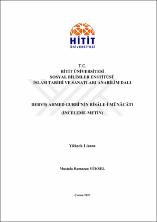| dc.contributor.advisor | Kiraz, Seydi | |
| dc.contributor.author | Yüksel, Mustafa Ramazan | |
| dc.date.accessioned | 2020-09-10T07:39:25Z | |
| dc.date.available | 2020-09-10T07:39:25Z | |
| dc.date.issued | 2020 | en_US |
| dc.date.submitted | 2020-06-08 | |
| dc.identifier.citation | Yüksel, M. R. (2020). Derviş Ahmed Gurbî"nin Risâle-i Munâcâtı (İnceleme-metin)(Yüksek Lisans Tezi). | en_US |
| dc.identifier.uri | https://hdl.handle.net/11491/5800 | |
| dc.identifier.uri | https://tez.yok.gov.tr/UlusalTezMerkezi/TezGoster?key=Eb5EkakJlp3olBdo_wNEGTKnEhKJ0cxV-8Hg-DrKAbN5gBzlTDlmdQs7uFHH1nae | |
| dc.description | YÖK ID: 625954 | en_US |
| dc.description.abstract | Üzerinde çalışılan bu eser, Derviş Ahmed Gurbî'ye ait şiirlerin olduğu müstakil bir münâcât örneğidir. Çalışmada, bu eserinde hayatıyla ilgili pek fazla bilgi bulunmayan müellif hakkında kaynaklarda bulunan bilgiler ortaya konmuş, eserdeki bilgilerden de hareketle şairin kimliğiyle ilgili kanaat oluşturulmaya çalışılmıştır. Müellifin, kaynaklarda adı geçen, 1698-99 yılında Bosna'nın Yenipazar şehrinde doğmuş olan Ahmed Gurbî olduğu düşünülmektedir. Risâle-i Münâcât dördü mesnevi, altısı kaside ve biri murabba nazım biçimiyle yazılmış toplam on bir şiirden oluşan bir eserdir. Bu şiirlerden dokuzu münâcât olup diğer ikisinden biri Kur'an diğeri Hz. Peygamber ve Hz. Ali övgüsündedir. İlk dokuz şiir başlıklar altında son iki şiir başlıksız yazılmıştır. Manzum bir eser olmasına rağmen eserdeki birçok şiirde mısralar birbirinin devamına yazılmıştır. Bu karışıklıklar çalışmalar sırasında giderilmeye çalışılarak beyitler veya dörtlükler haline getirilmiştir. Eser üzerinde yapılan incelemeler neticesinde, şairin Allah'ın isim ve sıfatlarını anlamlarına uygun olarak zikrettiği, peygamberlerin mucizelerine telmihlerde bulunduğu, ayet ve hadislerden iktibaslar yaptığı, Kur'an-ı Kerim'in mucizelerinden bahsettiği, birçok tasavvufî terimi kullandığı görülmüştür. Bu durum şairin din ve tasavvuf bilgisine sahip olduğunu göstermektedir. Hz. Ali'yi, Hz. Hasan ve Hz. Hüseyin'i zikrederken, Hz. Ali dışındaki üç büyük halifeyi hiç anmaması ise onun Alevî-Bektaşîliğe intisap etmiş bir kişi olduğuna işaret etmektedir. Bahsedilen dinî bilgileri, Arapça ve Farsça kelimeleri, kafiye ve rediflerle gayet akıcı bir üslupla şiirlerine aktarabilmiş olması da vezin hataları olsa bile onun iyi bir şair olduğunu göstermektedir. | en_US |
| dc.description.abstract | This work is an example of a detached relationship with poems of Dervish Ahmed Gurbî. In the study, information about the author of this work, which does not contain much information about the poet, has been revealed, and it has been tried to form an opinion about the identity of the poet based on the information in the work. The author is thought to be Ahmed Gurbi, who was mentioned in the sources, who was born in Yenipazar, Bosnia in 1698-99. The Booklet of Supplication of Dervish Ahmed Gurbî is a work consisting of a total of 11 poems, four of which are mesnevi, six of which are written in qasah and one written in verse. Nine of these poems are present and one of the other two is the Qur'an and the other is Hz. Prophet and Hz. Ali is in praise. The first nine poems were written under titles, and the last two poems were written without titles. Although it is a verse work, in many poems, the verses were written in succession. These confusions have been turned into couplets or quarters by trying to resolve them during the studies. As a result of the examinations on the work, it was seen that the poet chanted the names and attributes of Allah in accordance with their meanings, made prophets to the miracles of the prophets, made quotes from the verses and hadiths, used many sufistic terms. This shows that the poet has knowledge of religion and Sufism. Hz. Ali, Hz. Hasan and Hz. While citing Hüseyin, Hz. The fact that he did not remember the three great caliphs except Ali indicates that he was a person who had become a part of AleviBektashi. The fact that he was able to transmit the mentioned religious information, Arabic and Persian words, rhymes and redifs with a fluent style, shows that he was a good poet even if he had errors in meter. | en_US |
| dc.description.tableofcontents | İÇİNDEKİLER Sayfa ÖZET -- i ABSTRACT -- ii İÇİNDEKİLER -- iii ÖN SÖZ -- v GİRİŞ -- 1 BİRİNCİ BÖLÜM DERVİŞ AHMED GURBÎ’NİN HAYATI, ESERLERİ VE EDEBÎ ŞAHSİYETİ 1.1. HAYATI -- 5 1.2. ESERLERİ -- 7 1.3. MAHLASLARI -- 8 1.4. EDEBÎ ŞAHSİYETİ -- 9 İKİNCİ BÖLÜM ESERİN İNCELENMESİ 2.1. ESERİN ŞEKİL ÖZELLİKLERİ -- 13 2.1.1. Edebî Sanatlar -- 16 2.1.2. Dil ve Üslup -- 22 2.2. ESERİN MUHTEVA YÖNÜNDEN İNCELENMESİ -- 24 2.2.1. Din -- 25 2.2.1.1. Allah -- 25 2.2.1.2. Peygamberler -- 30 2.2.1.3. Diğer Dinî Şahsiyetler -- 36 2.2.1.4. Melekler -- 39 2.2.1.5. Şeytan -- 40 2.2.1.6. Kutsal Kitaplar -- 41 2.2.1.7. Ayetler -- 43 iv 2.2.1.8. Hadisler -- 45 2.2.1.9. Cennet ve Cehennem -- 46 2.2.2. Tasavvuf -- 48 ÜÇÜNCÜ BÖLÜM 3.1. METİN -- 59 SONUÇ -- 108 KAYNAKÇA -- 109 | en_US |
| dc.language.iso | tur | en_US |
| dc.publisher | Hitit Üniversitesi Sosyal Bilimler Enstitüsü | en_US |
| dc.rights | info:eu-repo/semantics/openAccess | en_US |
| dc.subject | Derviş Ahmed Gurbî | en_US |
| dc.subject | Münâcât | en_US |
| dc.subject | Türk İslam Edebiyatı | en_US |
| dc.subject | Dervish Ahmed Gurbî | en_US |
| dc.subject | Münâcât | en_US |
| dc.subject | Turkish Islamic Literature | en_US |
| dc.title | Derviş Ahmed Gurbî"nin Risâle-i Munâcâtı (İnceleme-metin) | en_US |
| dc.title.alternative | The Booklet of Supplication of Dervish Ahmed Gurbî (Examination-text) | en_US |
| dc.type | masterThesis | en_US |
| dc.department | Hitit Üniversitesi, Sosyal Bilimler Enstitüsü, İslam Tarihi ve Sanatları Anabilim Dalı | en_US |
| dc.relation.publicationcategory | Tez | en_US |
| dc.contributor.institutionauthor | Yüksel, Mustafa Ramazan | |


















